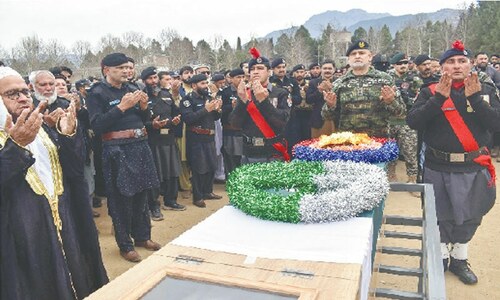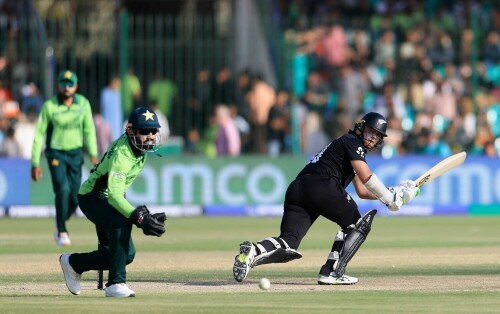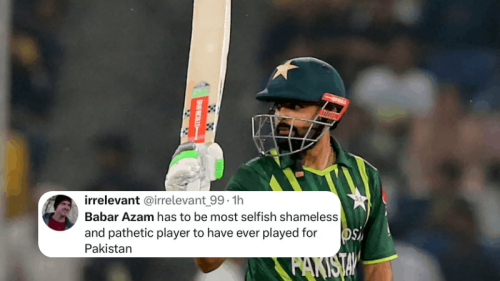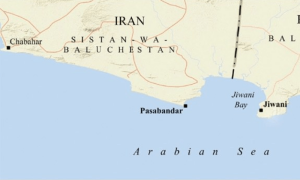WALI BAGH (Charsadda): Begum Nasim Wali is both angry and depressed. Angry because at a time when the Awami National Party’s ability to push back the rising tide of political Islam in the NWFP is the focus of attention of many at home and abroad, she has been completely sidelined by her own party. There was a time when she not only controlled and commanded the ANP she also tried to turn it into her personal fiefdom. This was mainly during the prolonged illness of her husband, the great Khan Abdul Wali Khan. Now she has no position in the party, and her supporters have no say in the party affairs.
But what really depresses her is the fact that despite all this, the party, under the dynamic leadership of her step-son, Asfandyar Wali, seems to be doing exceptionally well in the campaign for the January elections.
Treating us to a cup of tea at her Wali Bagh residence, which not so long ago was the bastion of Pakhtun nationalism, Begum Nasim was unable to hide her frustration. “Siasat kay Aqdaar Badal Gaye Hein (political values have changed)”, was her way of describing her helplessness. “The party doesn’t need me anymore. It has even denied ticket to Sangeen (her son), and to some of the known Khudai Khidmatgaars, and is bringing new faces to replace the old guards,” she said. Of course, what she was not prepared to discuss, and it was also not the occasion to bring up the topic, was the way she had tried to virtually sideline Asfandyar in the past, and how the party suffered because of her policies and as a result of this inner family dispute.
As we were leaving Wali Bagh, a painting of the late Wali Khan kissing the forehead of his father, Ghaffar Khan, known to many as the ‘Frontier Gandhi’ for his peaceful resistance to the British rule, reminded us of the days when politics in the NWFP mostly centred round this family. But then the results of last elections proved to be the worst blow the party had ever suffered. The ANP was virtually wiped out from the province’s map by the MMA. The results made people forget even the defeat Khan Abdul Wali Khan had suffered at the hands of Maulana Hasan Jan in 1988. For the proud Pakhtun nationalist the result was so shocking that he decided to say goodbye to electoral politics. His reasoning was that if the people of his constituency cannot differentiate between a politician and a cleric, then they do not deserve him. Little did he know that the tide of Islamism that was to follow in less than two decades may change the political landscape of the entire province, and perhaps many other parts of the country.
But long before the present elections were announced, Asfandyar Wali had described the rise of the religious-right in the form of MMA as more of an aberration than a popular movement.
For him, the circumstances in the region, and their effective exploitation by the religious-right, the denial of a level-playing field to other mainstream parties, and support from the country’s intelligence outfits, had worked effectively to eliminate all other groups in the polls.
But things are not the same any more. Even though the situation in neighbouring Afghanistan many have worsened, and the rise of armed Islamic militancy in the nearby tribal region continues to present a disturbing picture, most people say this time the determining factor would be MMA’s performance of the last five years. And that is where the ANP seems to have a clear edge. After having re-organised the ANP, and by brining in many new faces, Asfandyar’s party seems poised for a far better result this time.
A quick round of places like Mardan, Takht Bhai and Charsadda was enough to give some idea of the changing trends in the Frontier’s electoral politics. For instance, despite the boycott by some groups, including the Jamaat-i-Islami, the election frenzy in Mardan seems to have left all other places behind. It’s nearly impossible to count the number of banners, portraits and posters in the city, which has already created a carnival like atmosphere in the city. “Corner meetings in the city start from early morning, and go on till past midnight,” says Siddiq Bacha, president of the Mardan Press Club. “And it’s quite clear that the real contest in NA-10 (city constituency) is between the ANP and PPP”. Sitting beside him, a disgruntled former ANP member and local advocate, Naveed Khan, is quick to add that this time the real factor that will determine the outcome is money. That’s why, he says, both the PPP and ANP have ignored diehard members and have preferred “nawabzadas and khanzadas” or, according to him, the richest of the rich. Sitting in the group, a veteran ‘red shirt’, Lala Shahjehan, is quite amused. He doesn’t deny anything said there, but says all political parties have to adjust to new realities in order to move on. A few others sitting in the group and sipping tea nod their heads in agreement, but one of them insists that this time the PPP has an edge in Mardan because of its past reputation of carrying out development work and giving jobs.
Unemployment clearly looks like a major issue here. So much so that in Takht Bhai a billboard put up for a provincial assembly candidate describes him as ‘Baba-e-Rozgaar’ or father of employments. And that is where Aftab Sherpao and his own faction of the PPP have found an edge in some pockets of Charsadda and Mardan. During his tenure as interior minister, Sherpao was known to have distributed a large number of jobs to people from the areas where his party has some roots. So it’s small wonder that many believe that it may be quite difficult to uproot him from his own constituency in Charsadda.
The city’s other seat is where Wali Bagh is located, and Asfandyar is determined to get it back from the MMA. But even though the ANP has made a comeback in the NWFP politics in a big way, he is not taking any chances. Asfandyar is contesting from Swabi as well. Sherpao is also contesting for a provincial assembly seat, and Maulana Fazlur Rehman has also found a relatively safe seat in Bannu, just in case his voters in Dera Ismail Khan turn against him.
This clearly shows how uncertain the situation is, which perhaps is also indicative of a possible hung provincial assembly.
In some places it is hard to spot a flag or banner of an MMA candidate. But this does not mean the alliance has disappeared. There are areas like Takht Bhai where the local MMA leader still commands respect and may get elected, though by a narrow margin. Two very different explanations are given for the sudden drop in MMA’s pre-election showing in the area. One is that the Jamaat has boycotted the polls, and Maulana Fazlur Rehman’s JUI-F is finding it difficult to match its previous performance in the campaign. But as an independent candidate in Takht Bhai said, the Jamaat might have withdrawn because it knew that this time the voters were not going to elect the MMA to power.
And it’s quite understandable. Many people who voted for the MMA in 2002 are quite angry with what they call the new face of their leaders. “The person I had elected had come to ask for his vote on foot. Now he roams around in a 4X4,” says a fruit-seller. Because of this reason many MMA cabinet members from the previous NWFP government are now referred to as the ‘Land Cruiser Mullahs’.
One of the amazing characteristics of the present campaign is that there are no real takers for Islamabad’s policy of a full-fledged military operation in Waziristan and Swat. If the MMA blames the government for using Muslim troops for killing brother Muslims, the ANP sees it as an operation against the Pakhtuns. But conspiracy theories being presented by all sides notwithstanding, no one seem to know how the armed Islamic militancy can be contained.
The MMA’s failure to deliver in the last five years may have helped the ANP and PPP to make a comeback in the NWFP’s Pakhtun belt, with the two Muslim Leagues fighting for the remaining seats in the province’s Hazara areas. But this certainly does not mean that the Islamic militancy is on the retreat. If anything, it is on the rise and is gradually taking over from the Islamic groups that still believe in parliamentary democracy. And as a seasoned observer of NWFP politics in Mardan said, only those aware of the challenge the pro-democracy Islamic groups were facing in today’s situation could appreciate the decision of the JUI-F to remain in the electoral contest.












































